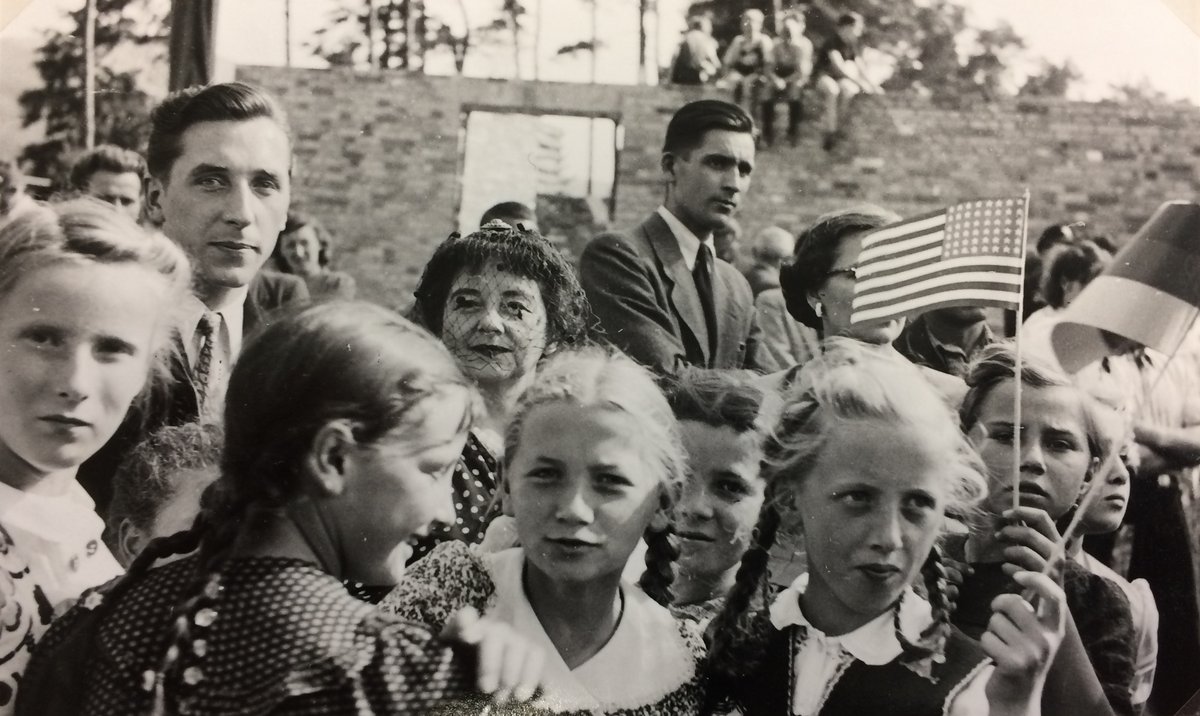Investments in Democracy The Special Projects Program of the US High Commissioner for Germany

Research project "Architecture as a Medium of American Cultural Diplomacy in Germany between the Second World War and the Cold War" (Habilitation in the Faculty of Humanities at Bamberg University, 2019)
Awarded the University of Bamberg Habilitation Prize
In the postwar German context, architecture represented an immediate and highly visible arena for discourses of reform and reorientation. The United States participated in this discourse during its occupation of Germany by actively supporting the creation of a built environment that would be conducive to the cultivation of a Western-democratic mindset, and would thus further the USA's geopolitical aims in central Europe.
By far the largest such American initiative – but one that has so far been underresearched – was the so-called Special Projects Program (SPP) established in 1949 by the American High Commissioner for Germany, John J. McCloy. McCloy was convinced that culture represented one of the most powerful means available for achieving the political and social ends toward which his government was striving in Germany. He established the SPP as a matching grant programme to support German initiatives that demonstrated a clear commitment to "the democratic, cultural approach which seeks to re-integrate Germany into the West European community of nations". McCloy's goal was "to create a new intellectual and social climate" in Germany through the implementation of what he called "a Marshall Plan in cultural matters". German citizens with an idea for a project were required to submit to their local authorities a detailed description and proposal, which would then be judged according to its "specific reorientation value".
Between 1949 and the end of the program in 1952, McCloy and his Special Projects Board received thousands of submissions, of which 473 were finally approved. The majority were architectural in nature: they included schools and universities, community centres, youth hostels, and libraries. Some projects, like the Amerika-Gedenkbibliothek in Berlin, are acknowledged icons of postwar design, but their origins in the SPP has been all but forgotten. Many others remain entirely unknown even to architectural and urban historians.
The habilitation project aimed at introducing the SPP and contextualizing it within America's larger effort to shape the built environment and through it the postwar world order. At the same time, the project made visible an architectural heritage which, while omnipresent, is currently unrecognized and therefore faces the threat of erasure from Germany’s built landscape.
Publications associated with the research project
Johanna Blokker, "Architektur als Medium US-amerikanischer Kulturdiplomatie in Deutschland nach 1945: Die Dominikanerkirche in Bamberg", in: Bamberg: Militär und Stadt, ed. Gabriele Wiesemann and Sabine Freitag (Petersberg: Michael Imhof Verlag, 2019), pp. 135-163.
Johanna Blokker, "Was nach dem Kalten Krieg übrig bleibt. Umnutzung und Umdeutung der gebauten Hinterlassenschaften der amerikanischen Präsenz in Deutschland", in: Strukturwandel – Denkmalwandel. Umbau, Umnutzung, Umdeutung. Veröffentlichungen des AKTLD 25, ed. Birgit Franz and Ingrid Scheurmann (Holzminden, 2016), pp. 114-121.
Johanna Blokker, "Habilitation Project: Architecture as a Medium of American Cultural Diplomacy in Germany Between the Second World War and the Cold War", in: Forschende Frauen in Bamberg. Beiträge Bamberger Nachwuchswissenschaftlerinnen 8, ed. Ada Raev, Iris Herrmann and Brigitte Eierle (University of Bamberg Press, 2016), pp. 47-61.
Johanna Blokker, "From the Heritage of the German "Other" to the Heritage of the "Other" Germany: American policy on German architectural heritage between the Second World War and the Cold War, in: Das Erbe der Anderen. Denkmalpflegerisches Handeln im Zeichen der Globalisierung, ed. Gerhard Vinken and Carmen Enss (University of Bamberg Press, 2015), pp. 49-57.
Lectures on the research topic
"Bauliches Erbe in der Besatzungspolitik der Westalliierten in Deutschland nach 1945", Faculty of Humanities at Bamberg University, 2019
"The Special Projects Program of the American High Commissioner for Germany", Urban Renewal and Resilience: Cities in Comparative Perspective, European Association of Urban Historians (EAUH) 14th International Conference, Rome, 2018
"Konversion und Konservierung: Der Erinnerungswert ehemaliger Militärstützpunkte und die Möglichkeiten seiner Erhaltung und Realisierung", Workshop Ehemalige militärische Liegenschaften im urbanen Raum – Konversion für die Zukunftsstadt?, Bonn International Centre for Conversion (BICC), 2015
"Was nach dem Kalten Krieg übrig bleibt. Umnutzung und Umdeutung der gebauten Hinterlassenschaften der amerikanischen Präsenz in Deutschland nach 1989", Strukturwandel – Denkmalwandel. Umdeutung, Umnutzung, Umbau, annual conference of the Working Group on Theory and Education in Heritage Conservation (AKTLD), Dortmund, 2015
"Germany's Amerika-Häuser: Architecture in the Battle for Hearts and Minds" , lecture series Making America, Chair in American Studies, Bamberg University, 2015
"American Cultural Diplomacy and the Rebuilding of Germany after 1945", Edinburgh School of Architecture and Landscape Architecture (ESALA) Research Seminar Series, Edinburgh University, 2014
"Architektur als Medium amerikanischer Kulturdiplomatie in Deutschland nach 1945: Die Dominikanerkirche in Bamberg", Bamberg: Militär und Stadt. Öffentliche Vortragsreihe zur Bamberger Militärgeschichte anlässlich der Konversion, Bamberg University, 2014
Follow-on projects
Buildings of the Allied Occupation in Western Germany (1945-1955)The heritage of democratization in Germany's built landscape, funded by the German Research Foundation (DFG)
Architecture and Democratization: Overlooked witnesses to Allied intervention in occupied Germany after 1945, international conference at Bamberg University, 3-5 June 2021
Research-led teaching
Seminar Konversion und Konservierung: Ehemalige Militärstützpunkte und die Erhaltung ihrer Erinnerungswerte, Master's Program in Heritage Conservation, Bamberg University, Summer Semester 2020.
Seminar Wiederaufbau nach beiden Weltkriegen in Deutschland und Europa, Master's Program in Heritage Conservation, Bamberg University, Winter Semester 2012-13, 2017-18, 2019-20.
Seminar Denkmalpflege und Politik - Denkmalpflege als Politik, Master's Program in Heritage Conservation, Bamberg University, Winter Semester 2017-18, 2019-20.
Seminar Schöne neue Welt: Internationale Beiträge zum Wiederaufbau in Deutschland nach 1945, Master's Program in Heritage Conservation, Bamberg University, Winter Semester 2014-15.
Seminar Denkmalkulturen International, Master's Program in Heritage Conservation, Bamberg University, Winter 2012-13, Summer Semester 2015.
Contact
Prof. Johanna M. Blokker
Chair in Architectural Conservation
Institute for Construction History and Art History
Brandenburg Technical University Cottbus-Senftenberg
Building 2B, Room 0.12
Konrad-Wachsmann-Allee 4
03044 Cottbus
Tel: ++49 355 69 3992
Tel: ++49 355 69 3117 (departmental office)
E-mail: Johanna.Blokker(at)b-tu.de
